浪漫主义时期文学 the lamb the tyger william blake教学内容
william blake 的文学作品
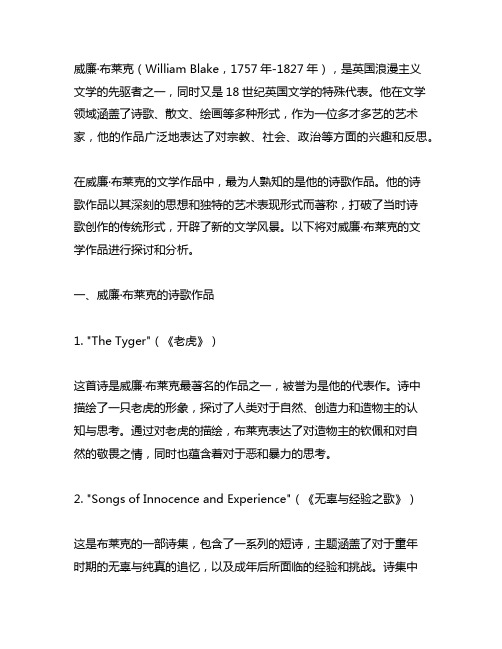
威廉·布莱克(William Blake,1757年-1827年),是英国浪漫主义文学的先驱者之一,同时又是18世纪英国文学的特殊代表。
他在文学领域涵盖了诗歌、散文、绘画等多种形式,作为一位多才多艺的艺术家,他的作品广泛地表达了对宗教、社会、政治等方面的兴趣和反思。
在威廉·布莱克的文学作品中,最为人熟知的是他的诗歌作品。
他的诗歌作品以其深刻的思想和独特的艺术表现形式而著称,打破了当时诗歌创作的传统形式,开辟了新的文学风景。
以下将对威廉·布莱克的文学作品进行探讨和分析。
一、威廉·布莱克的诗歌作品1. "The Tyger"(《老虎》)这首诗是威廉·布莱克最著名的作品之一,被誉为是他的代表作。
诗中描绘了一只老虎的形象,探讨了人类对于自然、创造力和造物主的认知与思考。
通过对老虎的描绘,布莱克表达了对造物主的钦佩和对自然的敬畏之情,同时也蕴含着对于恶和暴力的思考。
2. "Songs of Innocence and Experience"(《无辜与经验之歌》)这是布莱克的一部诗集,包含了一系列的短诗,主题涵盖了对于童年时期的无辜与纯真的追忆,以及成年后所面临的经验和挑战。
诗集中的作品多以儿童的视角来描绘世界,通过对无辜和经验的对比,反映了布莱克对人性和社会的深刻思考。
3. "The Marriage of Heaven and Hell"(《天堂与地狱的婚姻》)这首诗是布莱克的另一部代表作,通过对天堂和地狱的对立与统一的思考,表达了布莱克对于宗教、道德和人性的独特见解。
诗中融合了宗教、哲学、神秘主义等多种元素,展现了布莱克独特的艺术风格和思想深度。
二、威廉·布莱克的散文作品除了诗歌作品之外,布莱克还有大量的散文作品,其中最著名的是《天真与经验的对照》,这部作品深刻地探讨了人类天性和社会现实的关系,对于儿童、教育和社会问题进行了系统性的分析和解读。
经典:浪漫主义诗人William-Blake

The poison of the Honey Bee
12
❖
❖
❖ Is the Artist's Jealousy.
❖
The Prince's Robes & Beggars' Rags
❖
Are Toadstools on the Miser's Bags.
❖
A truth that's told with bad intent
11
<<天真的预兆>> Auguries of Innocence
To see a World in a Grain of Sand ❖
❖
And a Heaven in a Wild Flower,
❖
Hold Infinity in the palm of your hand❖
And Eternity in an hour.
当你的心脏开始搏动时, 使用怎样猛的手腕和脚胫? ❖ (郭沫若译)
7
❖ 布莱克生活在工业革命刚刚起步的英国。
❖ 他用老虎来象征所有掠夺性的,可怕的和神秘的 事物;用羔羊来比喻纯朴的,温和的和善良的事 物。他不可理解造出了温顺羔羊的同一个造物主 也造出了凶狠而嗜血成性的老虎。
❖ 《老虎》一诗既描写了老虎威风凛凛的英姿(第 一节),但也更多的却是描叙了作者想象出来的 造物如何造就这一庞然大物的过程细节。
2
❖ 第一本诗集 ❖ ——Poetical Sketches
(诗的素描)
这部书的出版现在已被认为是 十八世纪后期诗坛的头等大事 之一 布莱克的少年时期作品就足以 使他列入所谓“浪漫主义复兴” 的主要先驱者之一了。
英美文学流派与作家知识点整理
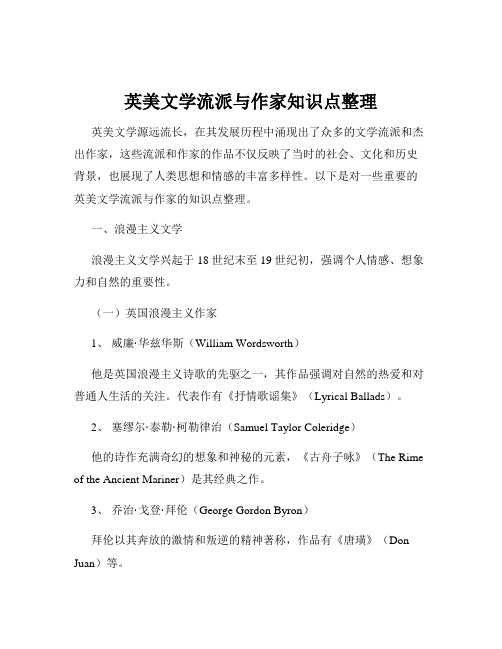
英美文学流派与作家知识点整理英美文学源远流长,在其发展历程中涌现出了众多的文学流派和杰出作家,这些流派和作家的作品不仅反映了当时的社会、文化和历史背景,也展现了人类思想和情感的丰富多样性。
以下是对一些重要的英美文学流派与作家的知识点整理。
一、浪漫主义文学浪漫主义文学兴起于 18 世纪末至 19 世纪初,强调个人情感、想象力和自然的重要性。
(一)英国浪漫主义作家1、威廉·华兹华斯(William Wordsworth)他是英国浪漫主义诗歌的先驱之一,其作品强调对自然的热爱和对普通人生活的关注。
代表作有《抒情歌谣集》(Lyrical Ballads)。
2、塞缪尔·泰勒·柯勒律治(Samuel Taylor Coleridge)他的诗作充满奇幻的想象和神秘的元素,《古舟子咏》(The Rime of the Ancient Mariner)是其经典之作。
3、乔治·戈登·拜伦(George Gordon Byron)拜伦以其奔放的激情和叛逆的精神著称,作品有《唐璜》(Don Juan)等。
4、珀西·比希·雪莱(Percy Bysshe Shelley)雪莱的诗歌富有理想主义和革命精神,《西风颂》(Ode to theWest Wind)广为流传。
(二)美国浪漫主义作家1、华盛顿·欧文(Washington Irving)他的作品具有浓厚的地方色彩和幽默风格,《瑞普·凡·温克尔》(Rip Van Winkle)是其代表作。
2、詹姆斯·费尼莫·库珀(James Fenimore Cooper)以描写边疆生活和印第安人而闻名,《皮袜子故事集》(The Leatherstocking Tales)是其重要作品。
二、现实主义文学现实主义文学在 19 世纪中叶兴起,注重真实地反映社会现实和生活。
(一)英国现实主义作家1、查尔斯·狄更斯(Charles Dickens)狄更斯的作品生动描绘了英国社会底层人民的生活,如《雾都孤儿》(Oliver Twist)、《大卫·科波菲尔》(David Copperfield)。
浪漫主义时期英国文学

五.浪漫主义时期(1798年-1832年)托马斯·格雷(Thomas Gray):“感伤主义”(Sentimentalism)诗人。
“墓园派诗人”(graveyard school)。
代表作《墓园挽诗》(An Elegy Written in a Country Churchyard)。
威廉·布莱克(William Blake):诗人,代表作《天真之歌》(Songs of Innocence),《经验之歌》(Songs of Experience)。
罗伯特·彭斯(Robert Burns):苏格兰杰出的农民诗人。
作品:《一朵红红的玫瑰》(A Red, Red Rose),《昔日的好时光》(Auld Lang Syne)。
威廉·华兹华斯(William Wordsworth):“湖畔派”诗人(Lake poets),“桂冠诗人”(Poet Laureate)。
代表作《独自云游》(I Wandered Lonely as a Cloud),《孤寂的割麦女》(The Solitary Reaper),《丁登寺杂咏》(Lines Composed a Few Miles about Tintern Abbey),《序曲》(The Prelude)。
塞缪尔·泰勒·柯勒律治(Samuel Taylor Coleridge):“湖畔派”诗人(Lake poets)。
代表作《古舟子咏》(The Rime of the Ancient Marine),《忽必烈汗》(Kubla Khan),《克里斯塔贝尔》(Christabel)。
罗伯特·骚塞(Robert Southey):最年轻的“湖畔派”诗人(Lake poets),“桂冠诗人”(Poet Laureate)。
代表作短诗《布莱尼姆之战》(The Battle of Blenheim),《我与死者做伴的日子已经结束》(My Days among the Dead are Past),《撒拉巴》(Thalaba the Destroyer),长诗《克哈马的诅咒》(The Curse of Kehama)。
体现丰富的想象的英国浪漫主义文学作品
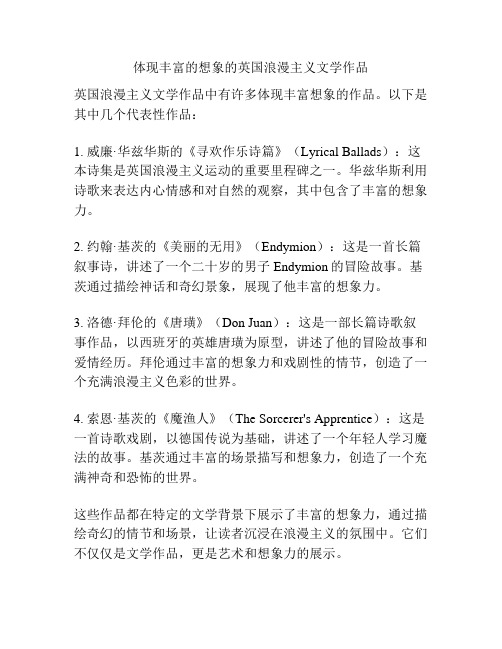
体现丰富的想象的英国浪漫主义文学作品
英国浪漫主义文学作品中有许多体现丰富想象的作品。
以下是其中几个代表性作品:
1. 威廉·华兹华斯的《寻欢作乐诗篇》(Lyrical Ballads):这本诗集是英国浪漫主义运动的重要里程碑之一。
华兹华斯利用诗歌来表达内心情感和对自然的观察,其中包含了丰富的想象力。
2. 约翰·基茨的《美丽的无用》(Endymion):这是一首长篇叙事诗,讲述了一个二十岁的男子Endymion的冒险故事。
基茨通过描绘神话和奇幻景象,展现了他丰富的想象力。
3. 洛德·拜伦的《唐璜》(Don Juan):这是一部长篇诗歌叙事作品,以西班牙的英雄唐璜为原型,讲述了他的冒险故事和爱情经历。
拜伦通过丰富的想象力和戏剧性的情节,创造了一个充满浪漫主义色彩的世界。
4. 索恩·基茨的《魔渔人》(The Sorcerer's Apprentice):这是一首诗歌戏剧,以德国传说为基础,讲述了一个年轻人学习魔法的故事。
基茨通过丰富的场景描写和想象力,创造了一个充满神奇和恐怖的世界。
这些作品都在特定的文学背景下展示了丰富的想象力,通过描绘奇幻的情节和场景,让读者沉浸在浪漫主义的氛围中。
它们不仅仅是文学作品,更是艺术和想象力的展示。
美国浪漫主义时期文学家及其作品
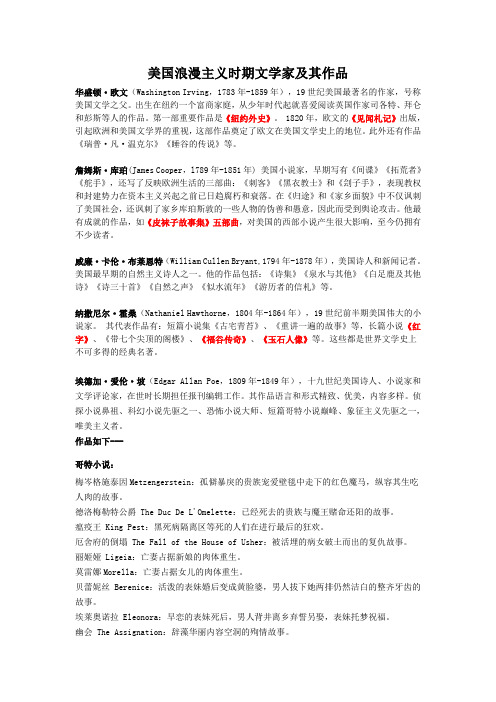
美国浪漫主义时期文学家及其作品华盛顿·欧文(Washington Irving,1783年-1859年),19世纪美国最著名的作家,号称美国文学之父。
出生在纽约一个富商家庭,从少年时代起就喜爱阅读英国作家司各特、拜仑和彭斯等人的作品。
第一部重要作品是《纽约外史》。
1820年,欧文的《见闻札记》出版,引起欧洲和美国文学界的重视,这部作品奠定了欧文在美国文学史上的地位。
此外还有作品《瑞普·凡·温克尔》《睡谷的传说》等。
詹姆斯·库珀(James Cooper,l789年-1851年) 美国小说家,早期写有《间谍》《拓荒者》《舵手》,还写了反映欧洲生活的三部曲:《刺客》《黑衣教士》和《刽子手》,表现教权和封建势力在资本主义兴起之前已日趋腐朽和衰落。
在《归途》和《家乡面貌》中不仅讽刺了美国社会,还讽刺了家乡库珀斯敦的一些人物的伪善和愚意,因此而受到舆论攻击。
他最有成就的作品,如《皮袜子故事集》五部曲,对美国的西部小说产生很大影响,至今仍拥有不少读者。
威廉·卡伦·布莱恩特(William Cullen Bryant,1794年-1878年),美国诗人和新闻记者。
美国最早期的自然主义诗人之一。
他的作品包括:《诗集》《泉水与其他》《白足鹿及其他诗》《诗三十首》《自然之声》《似水流年》《游历者的信札》等。
纳撒尼尔·霍桑(Nathaniel Hawthorne,1804年-1864年),19世纪前半期美国伟大的小说家。
其代表作品有:短篇小说集《古宅青苔》、《重讲一遍的故事》等,长篇小说《红字》、《带七个尖顶的阁楼》、《福谷传奇》、《玉石人像》等。
这些都是世界文学史上不可多得的经典名著。
埃德加·爱伦·坡(Edgar Allan Poe,1809年-1849年),十九世纪美国诗人、小说家和文学评论家,在世时长期担任报刊编辑工作。
英文诗歌分析全文Lamb、tyger、rose
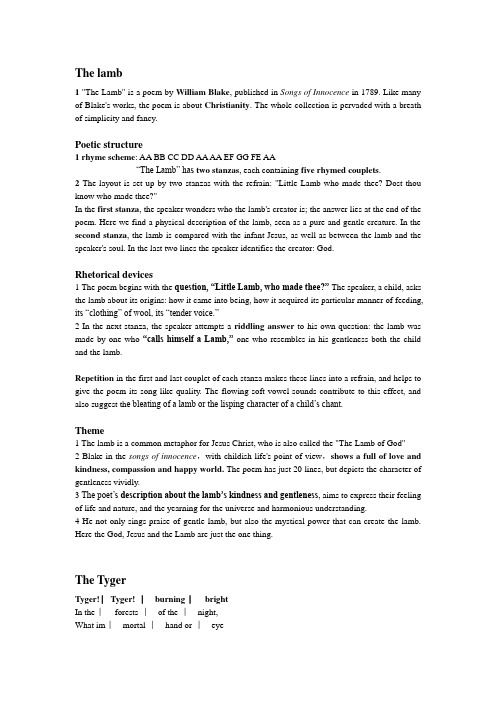
The lamb1 "The Lamb" is a poem by William Blake, published in Songs of Innocence in 1789. Like many of Blake's works, the poem is about Christianity. The whole collection is pervaded with a breath of simplicity and fancy.Poetic structure1rhyme scheme: AA BB CC DD AA AA EF GG FE AA“The Lamb” has two stanzas, each containing five rhymed couplets.2 The layout is set up by two stanzas with the refrain: "Little Lamb who made thee? Dost thou know who made thee?"In the first stanza, the speaker wonders who the lamb's creator is; the answer lies at the end of the poem. Here we find a physical description of the lamb, seen as a pure and gentle creature. In the second stanza, the lamb is compared with the infant Jesus, as well as between the lamb and the speaker's soul. In the last two lines the speaker identifies the creator: God.Rhetorical devices1 The poem begins with the question, “Little Lamb, who made thee?” The speaker, a child, asks the lamb about its origins: how it came into being, how it acquired its particular manner of feeding, its “clothing” of wool, its “tender voice.”2 In the next stanza, the speaker attempts a riddling answer to his own question: the lamb was made by one who “calls himself a Lamb,” one who resembles in his gentleness both the child and the lamb.Repetition in the first and last couplet of each stanza makes these lines into a refrain, and helps to give the poem its song-like quality. The flowing soft vowel sounds contribute to this effect, and also suggest th e bleating of a lamb or the lisping character of a child’s chant.Theme1 The lamb is a common metaphor for Jesus Christ, who is also called the "The Lamb of God"2 Blake in the songs of innocence,with childish life's point of view,shows a full of love and kindness, compassion and happy world. The poem has just 20 lines, but depicts the character of gentleness vividly.3 The poet’s description about the lamb’s kindness and gentleness, aims to express their feeling of life and nature, and the yearning for the universe and harmonious understanding.4 He not only sings praise of gentle lamb, but also the mystical power that can create the lamb. Here the God, Jesus and the Lamb are just the one thing.The TygerTyger! ︳Tyger! ︳burning ︳ brightIn the ︳ forests ︳of the ︳night,What im ︳mortal ︳hand or ︳eyeCould ︳frame thy ︳ fearful ︳symmetry?Analysis: In the this verse, the author compares the fierceness of a tiger to a burning presence in dark forests. He wonders what immortal power could create such a fearful beast.*Line 1 is an example of synecdoche(提喻), a literary device used when a part represents the whole or the whole represents a part. In line 1 "Tyger! Tyger! burning bright" alludes to the predator's eyes.In what ︳ distant ︳deeps or ︳skiesBurnt the ︳ fire of ︳ thine eyes?On what ︳wings dare ︳he as ︳pireWhat the ︳hand, dare ︳seize the ︳ fire?Analysis: Here the poet compares the burning eyes of the tiger to distant fire that only someone with wings could reach. The poet wonders where such a powerful fire could have comeAnd what ︳shoulder, ︳and what ︳art,Could ︳twist the ︳sinews ︳ of thy ︳ heartAnd when ︳ thy heart ︳began to ︳beat,What dread ︳hand?and ︳what dread ︳ feet?Analysis: In the third stanza we have a metaphor giving us a vision a skillful and powerful blacksmith creating the tiger's beating heart awakening a powerful beast.The phrase “...twist the sinews of thy heart" is also an allusion to a hardheartedness that a beast of prey must have towards the creatures it kills.What the︳ hammer?︳ what the ︳ chain?In what︳ furnace︳ was thy ︳ brain?What the︳ anvil?︳ what dread ︳ graspDare its ︳ deadly ︳ terrors ︳ clasp?Analysis: This verse continues the allusion to a creator, who, having made the fearsome beast, must confront with the sheer terror of a tiger's natureWhen the ︳ stars threw ︳ down their ︳ spears,And wa ︳ter’d hea ︳ven with ︳ their tears,Did he ︳smile his ︳ work to ︳see?Did he ︳ who made ︳the Lamb ︳make thee?Analysis: In the fifth stanza,the author, with beautiful rhetoric (personification),describes a marvelous creation process likening starlight to a symbolic destructive process.The author wonders whether the creator of the fierce and predatory tiger could make the docile, gentle lamb. He sees a conflict between the creation of heartless, burning predator and its potential victim, the lamb.Tyger! ︳Tyger! ︳burning ︳brightIn the ︳ forests ︳of the ︳ nightWhat im ︳mortal ︳hand or ︳eyeDare ︳ frame thy ︳fearful ︳symmetry?Analysis: The final verse is but a reprise, almost a chorus. It serves the purpose of repeating the wondrous question of the tiger's creation and gives the reader another chance to enjoy the rhetorical and already answered question, "What immortal hand or eye?"The answer lies in the reader's interpretation of creation: Did God create the fearsome along with the gentle? Why does He allow the tiger to burn in the dark forest, while the lamb gambols in the glen under the stars of that very creation? The author leaves it up to the reader to decide. The important thing is the question, not the answer.Background information: The Tyger" is a poem by the English poet William Blake. It was published as part of his collection Songs of Experience in 1794. The Cambridge Companion to William Blake (2003) calls it "the most anthologized poem in English."解析题目:His choice of "tyger" has usually been interpreted as being for effect, perhaps to render an "exotic or alien quality of the beast", or because it's not really about a "tiger" at all, but a metaphor.The Meter: trochee tetrameter. (the poem is in trochaic tetrameter)The poem is comprised of six quatrains (A quatrain is a four-line stanza) in rhymed couplets. The Rhyme Scheme:aa bb with a near rhyme(近似韵)ending the first and last stanzas, drawing attention to the tiger's "fearful symmetry."Rhetorical devices1 Repetition of "Tyger" in line 1, "dare" in lines 7 & 8, "heart" in lines 10 & 11, "what" in lines12, 13, & 15, "Did he" in lines 19-20, and several repeats in stanzas 1 &2 establish the poem's nursery rhyme like rhythm.2Alliteration in "The Tyger" abounds and helps create a sing-song rhythm. Examples include the following:"b urning b right" (1) "f rame thy f earful (4) "d istant d eeps" (5) "w hat w ings" (7) "b egan to b eat" (11) "d are its d eadly" (16) "h e wh o" (20)3 Symbolism:(1) the tiger represents the dangers of mortality; (powerful force with terror, mystery and violence eg: fearful symmetry, dread hand, obscure in symbolic meaning)(2)the fire imagery symbolizes trials(3) the forest of the night represents unknown realms or challenges;(4) the blacksmith represents the Creator;(5) the fearful symmetry symbolizes the existence of both good and evil, the knowledge that there is opposition in all things, a rather fearful symmetry indeed.* SymbolsThe Lamb: GodDistant Deeps: HellThe Tiger: Evil (or Satan)Skies: Heaven4Metaphor: Compare the tiger’s eyes to fire.5 Anaphora: Repetition of what at the beginning of sentences or clauses. (首语重复法) Example: What dread hand and what dread feet? / What the hammer? what the chain?ThemeThe poem is more about the creator of the tiger than it is about the tiger itself. The poet was at a loss to explain how the same God who made the lamb could make the tiger. So, the theme is: humans are incapable of fully understanding the mind of God and the mystery of his handiwork.COMPARISON between the lamb and the tyger1 "The Tyger" is the sister poem to “The Lamb" “Songs of Innocence”, a reflection of similar ideas from a different perspective, but it focuses more on goodness than evil.2 Both are creation poems3 Structure of the “The Lamb” is more obviously singular when compared with the complexity of “The Tiger,” whose complexity is achieved through layered questions without answers, while the Lamb poses a simple, singular question and then directly answers it.The sick roseO Rose, thou art sick. 啊玫瑰你病了The invisible worm 那看不见的虫That flies in the night 在夜里飞翔In the howling storm 在呼啸的暴风雨中Has found out thy bed 发现了你深红色Of crimson joy, 快活的床And his dark secret love 他黑色的秘恋Does thy life destroy. 摧毁了你我的生命Analysisrhyme scheme: abcb (2 quatrains or 2 stanzas)images: rose, worm, storm, bed1 Line 1: The form of address—"O rose"—is called an apostrophe. The rose here could be a metaphor for love or passion2 Line 2-3: "Invisible" might be a metaphor for the worm's quiet act of destruction.3 Line 4: The speaker mentions a "howling storm," which gives the poem a more ominous tone. "Howling" reminds us of dogs or wolves; the sounds of those animals are here a metaphor for the storm4 Line 5-6: "Bed" might refer to a plot of ground in which the rose is growing, which it's not a literal bed with pillows, but a metaphor for the plot of ground. Or bed can refer to the rose's petals, which is a place where insects rest or sleep. In addition, the worm manages to worm his way into the rose's bed, which suggests some kind of sexual act.5 Lines 7-8: The speaker describes how the worm "destroys" the rose with his "dark secret love." It is an example of personification, where human characteristics or emotions (love) are attributed to non-human things (namely the worm).The Rose The rose exists as a beautiful object that has become infected by a worm; also as aliterary rose, the conventional symbol of love. It symbolizes innocence, nature and even pre-industrial England fall under this more encompassing category. The speaker opens by apostrophizing the rose, immediately setting a tone of despair that is intensified by the epithet of “sick”. The rose resides in a “bed”, which is a pun denoting both a flower bed and a human one. The sexual undertones are elevated by the evocation of “crimson joy”, which is almost paradox as the said color is distinctly sinister, often used to describe the appearance of blood and therefore tying into the poem’s suggestions of death. A literal death is not suggested, however, but a figurative one, as the rose's life is irreparably "destroy[ed]"The Worm The worm, meanwhile, symbolizes the destruction of this unspoiled state, its appearance evoking biblical images of the serpent in Eden. Worms are usually earthbound, and symbolize death and decay, therefore suggesting that it symbolizes something more sinister than death - in this case, the fall of mankind. The “bed” into which the worm creeps denotes both the nat ural flowerbed and also the lovers’ bed. The rose is sick, and the poem implies that love is sick as well, and it can also refer to the moral corruption. The “crimson joy” and the “dark secret love” imply both sexual pleasure and shame, which Blake thought was perverted and unhealthy.。
【精品】美国文学浪漫主义时期

【关键字】精品美国文学浪漫主义时期浪漫主义时期开始于十八世纪末,到内战爆发为止,是美国文学史上最重要的时期。
华盛顿·欧文出版的《见闻札记》标志着美国文学的开端,惠特曼的《草叶集》是浪漫主义时期文学的压卷之作。
浪漫主义时期的文学是美国文学的繁荣时期,所以也称为"美国的文艺复兴。
"美国社会的发展哺育了"一个伟大民族的文学"。
年轻的美国没有历史的沉重包袱,很快在政治、经济和文化方面成长为一个独立的国家。
这一时期也是美国历史上西部扩张时期,到1860年领土已开拓到太平洋西岸。
到十九世纪中叶,美国已由原来的十三个州扩大到二十一个州,人口从1790年的四百万增至1860年的三千万。
在经济上,年轻的美国经历向工业的转化,影响所及不仅仅是城市,而且也包括农村。
蒸汽动力在工、农业生产上的运用、工厂的建立、劳动力的大量需求以及科技上的发明创造使经济生活得到了重组。
另外,大量移民促进了工业更加蓬勃的发展。
政治上,民主与平等成为这个年轻国家的理想,产生了两党制。
值得一提的是这个国家的文学和文化生活。
随着独立的美国政府的成立,美国人民已感到需要有美国文学,表达美国人民所特有的经历:早期清教徒的殖民,与印第安人的遭遇,边疆开发者的生活以及西部荒原等。
这个年轻国家的文学富有想象,已产生了一种文学环境。
报刊杂志如雨后春笋,出现了一大批文学读者,形成了十九世纪上半叶蓬勃的浪漫主义的文学思潮。
外国的,尤其是英国的文学大师对美国作家产生了重大影响。
美国作家由于秉承了与英国一样的文化保守,形成了同英国一样的浪漫主义风格。
欧文(Irving)、库柏(Cooper),坡(Poe),弗伦诺(Freneau)和布雷恩特(Bryant)一一反古典主义时期的文学样式和文学思潮,开创了较新的小说和诗歌形式。
这一时期大多数美国文学作品中,普遍强调文学的想象力和情感因素,注重生动的描写、异国情调的表达、感官的体会和对超自然力的描述。
- 1、下载文档前请自行甄别文档内容的完整性,平台不提供额外的编辑、内容补充、找答案等附加服务。
- 2、"仅部分预览"的文档,不可在线预览部分如存在完整性等问题,可反馈申请退款(可完整预览的文档不适用该条件!)。
- 3、如文档侵犯您的权益,请联系客服反馈,我们会尽快为您处理(人工客服工作时间:9:00-18:30)。
Religion is the instrument
▪ A little black thing among the snow:
of their repression/ oppression its nature is to help bring misery
Crying weep, weep, in notes of woe!
▪ And because I am happy & dance & sing,
of his own and other’s work.
▪ 2. Major Works
➢ Songs of Innocence (1789) ➢ Songs of Experience (1794) ➢ Marriage of Heaven and Hell (1790) ➢ a few prophetic books,
:田野一片荒芜,道路长满荆棘;孩子们论落街头,挨家挨户扫
烟囱;士兵们在流血叹息,妓女们在夜半的街头诅咒;街道和河 流“专利”化,“残酷、妒忌、恐怖和隐秘”代替了“爱、仁慈、怜悯 与和平。”
▪ The Chimney Sweeper is the title of two poems by William Blake, published in Songs of Innocence in 1789 and Songs of Experience in 1794.In the earlier poem, a young chimney sweeper recounts a dream had by one of his fellows, in which an angel rescues the boys from coffins and takes them to a sunny meadow; in the later poem, an apparently adult speaker encounters a child chimney sweeper abandoned in the snow while his parents are at church.
浪漫主义时期文学 the lamb the tyger william blake
▪ To see a World in a Grain of Sand
▪ And a Heaven in a Wild Flower,
▪ Hold Infinity in the palm of your hand
▪ And Eternity in an hour. Nhomakorabea▪
---- William Blake: Auguries of Innocence
一沙一世界, 一花一片天, 掌中握无限, 永恒刹那间!
----译者不详
从一粒沙看世界, 从一朵花看天堂, 把永恒纳进一个时辰, 把无限握在自己手心。
——王佐良
▪ 1. Life and Career
➢ Born Nov. 28, 1757, in London. ➢ Son of a haberdasher. ➢ Largely self-taught. ➢ Originally studied to be an artist. ➢ Started writing poetry at 12. ➢ Supported himself as an engraver and illustrator
▪ Songs of Innocence : the innocent, pastoral world of childhood ; The Lamb
▪ Songs of experience: an adult world of corruption and repression; The Tyger.
▪ 在《天真之歌》中,诗人以“羔羊”为中心意象,组成一个欢乐、 善良、和谐的农业文明图景:牧童吹着欢乐的短笛,歌声荡漾在
青草地上;孩子在荒野中迷了路,上帝就化身为父亲将他送回家
去;小蚂蚁迷了路,萤火虫打着灯笼送它回家;羔羊在吃草,狮 子在羊栏边徘徊了一阵,流下“金色的眼泪”,终于躺下来和它睡 在一起……而在《经验之歌》中,诗人则以“老虎”为中心意象, 展现现一幅正在生长中的痛苦、邪恶、分裂的现代工来文明图景
to the poor children.
Where are thy father & mother? say?
They are both gone up to the church to pray.
Because I was happy upon the heath, And smil'd among the winters snow: They clothed me in the clothes of death, And taught me to sing the notes of woe.
Songs of Innocence/Experience
Songs of Innocence and Experience
▪ The Songs of Innocence were published by Blake in 1789, and he produced a combined version of Songs of Innocence and of Experience in 1794. The Songs are now often studied for their literary merit alone, but they were originally produced as illuminated books, engraved, hand-printed, and coloured by Blake himself. The text of the poem and the accompanying illustration formed an integrated whole, each adding meaning to the other.
